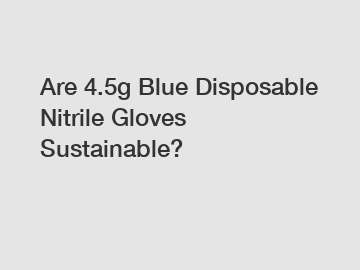Are 4.5g Blue Disposable Nitrile Gloves Sustainable?
Apr. 07, 2024
4.5g Blue Disposable Nitrile Gloves: A Sustainable Option?
Disposable gloves have become more important than ever in recent times due to the ongoing global health crisis. Nitrile gloves, in particular, have seen an increase in demand as they offer strong protection against chemicals, viruses, and bacteria. However, with concerns growing about the environmental impact of disposable gloves, many are questioning whether 4.5g blue disposable nitrile gloves are a sustainable choice.
Material Composition.

Nitrile gloves are made from a synthetic rubber compound that is free of latex proteins, making them an excellent alternative for individuals with latex allergies. The 4.5g refers to the weight of the glove per square meter, indicating that these gloves are lightweight and offer a high level of dexterity. This lightweight design not only enhances comfort but also reduces material usage, making them a more sustainable option compared to heavier gloves.
Biodegradability and Recycling.
One of the main drawbacks of nitrile gloves is that they are not biodegradable. Unlike latex gloves, which are made from natural rubber and can decompose over time, nitrile gloves do not break down easily in the environment. This means that proper disposal is essential to prevent them from contributing to pollution.
However, some companies have started offering recycling programs for nitrile gloves, allowing used gloves to be collected and processed into new products. While this is a step in the right direction, the availability and feasibility of these programs may vary, making it important to research options in your area.
Energy and Resource Use.
The production of disposable gloves, including nitrile gloves, requires significant amounts of energy and resources. From the extraction of raw materials to the manufacturing process, there are environmental impacts associated with every step. Additionally, the transportation of gloves to various distribution points further adds to the carbon footprint of these products.
To mitigate these environmental challenges, some manufacturers are exploring ways to reduce energy consumption and implement more sustainable practices in their production facilities. This includes using renewable energy sources, optimizing manufacturing processes, and implementing recycling initiatives.
Quality and Durability.
One factor to consider when evaluating the sustainability of 4.5g blue disposable nitrile gloves is their quality and durability. While thinner gloves may use less material, they may also be more prone to tears and punctures, leading to increased waste. High-quality gloves that are designed to last longer can help reduce the overall environmental impact by minimizing the need for frequent replacements.
In conclusion, 4.5g blue disposable nitrile gloves offer a lightweight and dexterous option for individuals in need of hand protection. While they may not be biodegradable, efforts are being made to improve the recycling and sustainability of these gloves. By considering factors such as material composition, biodegradability, energy use, and quality, consumers can make more informed choices about the environmental impact of their disposable glove usage.
For more information on sustainable disposable gloves or to explore recycling options, please contact us.
Contact us to discuss your requirements of 9 inch Black Examination Nitrile Gloves, 9 inch White Cleanroom Nitrile Gloves, wholesale china Medical nitrile exam gloves. Our experienced sales team can help you identify the options that best suit your needs.
476
0
0


Comments
All Comments (0)